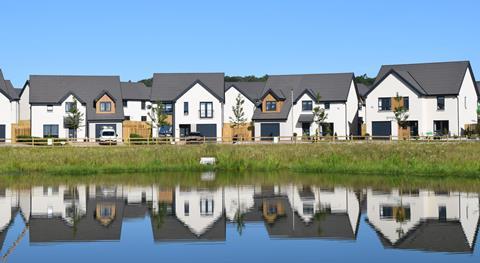Scottish housebuilder says earnings for current year will be below last year, despite increasing turnover
Shares in Scottish housebuilder Springfield fell sharply this morning after the firm said profit will fall in its year end results as it attempts to ride out falling demand for homes amid high inflation.
Springfield said in a half year trading update for the period to November 30 that it expects build cost inflation of 7.5% against static house prices, and that it had paused both its affordable housing and build to rent businesses because of uncertainty or freezes on rents, and that “these factors are expected to combine to impact the Group’s margin”.
Springfield said its forward orders, largely secured under the Scottish “missive” system of house sales, allied to the purchases of Mactaggart & Mickel and Tulloch Homes in the last year, meant it still expects “good revenue growth” for its full year results to May 2023 compared to the £257m reported this year.

However, with the “continued market uncertainty”, Springfield said it was “taking a cautious approach to expectations of future sales rates”, and now “expects to report” lower profit before tax for the current financial year than in the 2022 results.
Shares in the firm dropped more than 15% this morning, taking the housebuilders to its lowest valuation seen since the first weeks of the covid pandemic in the spring of 2020.
In the 12 months to May Springfield reported pre-tax profit of £19.7, a 10% increase on the level of the previous year. At the time of the results announcement in September it did not flag a sharp fall in margin, saying “the Group expects to deliver significant growth for the year to 31 May 2023, with record revenue driven by the contribution from private housing.”
>> See also Top 50 Housebuilders 2022: Full Tables
>> See also Top 50 Housebuilders 2022: In depth analysis
Elgin-based Springfield has been hit the last year by the Scottish government’s decision to freeze private sector rents in the country, which has seen the firm pause its Build to Rent partnership with Sigma Capital, and by build cost inflation on its affordable housing contracting business.
Springfield said: “The Group’s affordable housing business continues to be impacted due to the industry’s model of fixed price contracts and with the Scottish Government yet to review its affordable housing investment benchmark. The Group therefore continues to hold off from entering into long-term fixed price contracts in affordable housing.
“In addition, the Group’s plans to deliver homes for the private rented sector (PRS) are unlikely to come forward in the next couple of years following the Scottish Government’s introduction of a temporary rent freeze.”
Springfield said it had started the current financial year with a strong order book and good demand, despite a challenging market backdrop. “Since then, the rise in interest rates and broader economic uncertainty have impacted reservations for the Group’s private housing,” the statement said, adding: “Private house price growth is no longer anticipated in the short term rendering the increase in build costs more difficult to mitigate.”
Springfield did not quantify the extent of the reduction in demand for its homes in terms of reservation per site per week, and said it will provide further details in its interim results announcements in February.
Springfield’s update follows reports from a number of UK housebuilders showing the extent of the reduction in demand since the previous government’s “mini budget”, with most housebuilders reporting a spike in cancellations and reservations below 0.5 homes per site per week.
Mortgage lender Halifax last week reported a 2.4% drop in prices, the biggest monthly fall in house prices in 14 years.










No comments yet